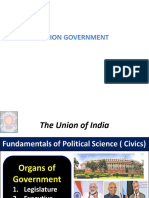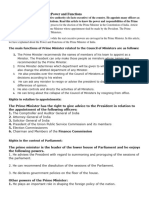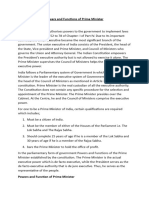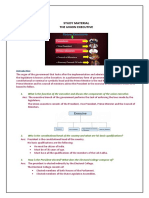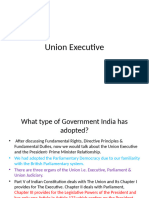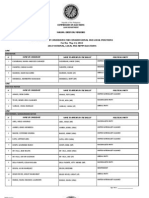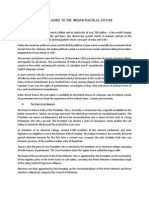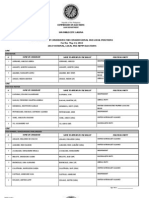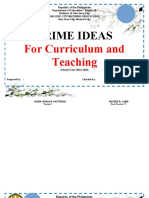PRIME MINISTER-1
PRIME MINISTER-1
Uploaded by
Justin HookeCopyright:
Available Formats
PRIME MINISTER-1
PRIME MINISTER-1
Uploaded by
Justin HookeCopyright
Available Formats
Share this document
Did you find this document useful?
Is this content inappropriate?
Copyright:
Available Formats
PRIME MINISTER-1
PRIME MINISTER-1
Uploaded by
Justin HookeCopyright:
Available Formats
PRIME MINISTER
Prime Minister is the real executive authority (de facto executive) in a parliamentary
form of government. PM is the head of the government.
APPOINTMENT
Article 75 – Prime Minister shall be appointed by the President.
• However, the President is not free to appoint anyone as the Prime Minister.
• As per the conventions of the parliamentary system – The President has to appoint
the leader of the majority party in the Lok Sabha as the Prime Minister.
• When no party has a clear majority in the Lok Sabha in case of coalition
governments.
In such cases, a vote of confidence must be passed in Lok Sabha within one month of
appointment of the Prime Minister.
In case of Death or Resignation of the Prime minister the entire council is dissolved and a new
council of ministers needs to be appointed.
QUALIFICATION
• He must be a citizen of India.
• He must be a member of either Rajya Sabha or Lok Sabha at the time of taking oath
or should be a member of any house within six months.
• He should have completed his 30 years if he is a member of the Rajya Sabha or can
be 25 years of age if he is a member of the Lok Sabha.
OATH
The President administers to him the oaths of office and secrecy.
TERM
• There is no fixed term for Prime Minister.
• He holds office till the pleasure of the president till he enjoys the majority support in the Lok
Sabha.
• The President cannot dismiss the PM as per his/her will.
• The Prime Minister can be dismissed by the President if he loses confidence of the Lok Sabha.
POWER AND FUNCTIONS
With Respect to the Council of • PM recommends a person to the President for
Minister appointment as ministers.
• The PM has the authority to assign portfolios to
the Ministers.
• Chairman of the cabinet and presides the meetings
of the Cabinet.
In relation with the President • Acts as the link between President and cabinet. He
communicates all decisions of the Cabinet to the
President which is related to the administration of
the affairs of the Union and proposal. (Article-78)
With Respect to the • leader of the lower house.
Parliament • recommend the President about the prorogued and
summoning the sessions of the Parliament.
• recommend the dissolution of the Lok Sabha at
any time to the President.
other functions and powers • Chairman of Niti Aayog, NDC, National
Integration Council, National Water Resource
Council and Inter-state council.
• Chief spokesman of the Union government.
You might also like
- NAKURU 2022 GE ResultsDocument54 pagesNAKURU 2022 GE ResultsChrisstael KaranjaNo ratings yet
- The Prime Minister of IndiaDocument4 pagesThe Prime Minister of Indiab200501038No ratings yet
- Powers and Functions of Prime Minister of IndiaDocument16 pagesPowers and Functions of Prime Minister of IndiasaranandmeNo ratings yet
- PM and COM - An OverviewDocument17 pagesPM and COM - An OverviewRavi CharanNo ratings yet
- Prime Minister and Council of Ministers F68efc78Document6 pagesPrime Minister and Council of Ministers F68efc78The Will of the NightNo ratings yet
- Prime Minister and Council of Ministers Upsc Polity Notes 27984b7bDocument5 pagesPrime Minister and Council of Ministers Upsc Polity Notes 27984b7brajhp54321No ratings yet
- Council of Ministers - 19115924 - 2023 - 11 - 28 - 10 - 59Document6 pagesCouncil of Ministers - 19115924 - 2023 - 11 - 28 - 10 - 593618 Rahul shardaNo ratings yet
- Module-3 Central Government 2Document35 pagesModule-3 Central Government 2shubh suriNo ratings yet
- The Union Executive2Document20 pagesThe Union Executive2Prathamesh TambeNo ratings yet
- ICSE G+10 the+Union+Executive NotesDocument8 pagesICSE G+10 the+Union+Executive Notesrd048889No ratings yet
- Powers and Functions of Prime MinisterDocument4 pagesPowers and Functions of Prime MinisterGul GoonNo ratings yet
- On PM and Council of MinistersDocument12 pagesOn PM and Council of MinistersShreyas Renukaradhya50% (2)
- Prime MinisterDocument8 pagesPrime Ministeru2201151No ratings yet
- Prime Minister and Council of Ministers in India 68Document3 pagesPrime Minister and Council of Ministers in India 68samdev2135No ratings yet
- Prime MinisterDocument6 pagesPrime Ministeramriteshrajtetri1811No ratings yet
- Hell's WorthDocument25 pagesHell's WorthJumsang JebisowNo ratings yet
- 20-The-Vice-president-converted-2-Vice President, Prime Minister and Council of MinisterDocument9 pages20-The-Vice-president-converted-2-Vice President, Prime Minister and Council of Ministerraviraj.bhange1No ratings yet
- Polity 27 _ Daily Class Notes __ UPSC Sankalp HinglishDocument5 pagesPolity 27 _ Daily Class Notes __ UPSC Sankalp Hinglishadityajha3gNo ratings yet
- Civics Chapter 3 - Prime Minister and Council of Ministers 2023Document15 pagesCivics Chapter 3 - Prime Minister and Council of Ministers 2023Thangsian KhaiNo ratings yet
- Polity 22 Prime MinisterDocument29 pagesPolity 22 Prime Ministerrishabhchaudhary823No ratings yet
- Unit 3Document47 pagesUnit 3xifoh46742No ratings yet
- 4.2 Powers of The PresidentDocument27 pages4.2 Powers of The PresidentPriyanshu PandeyNo ratings yet
- Appointment of Chief Minister A949e637Document4 pagesAppointment of Chief Minister A949e637ravishekkumarsingh294No ratings yet
- Union ExecutiveDocument3 pagesUnion ExecutiveChengchang MarakNo ratings yet
- SSC GK Polity Notes - Prime Minister of India & Council of MinistersDocument8 pagesSSC GK Polity Notes - Prime Minister of India & Council of MinistersMalu SakthiNo ratings yet
- COMDocument3 pagesCOMJustin HookeNo ratings yet
- Why Do We Need A ParliamentDocument13 pagesWhy Do We Need A ParliamentKANAV BINDRANo ratings yet
- Prime MinisterDocument5 pagesPrime Ministersantosh.shukla77077No ratings yet
- The Union Council of Ministers: Article 74 of Indian Constitution - Council of Ministers To Aid and Advise PresidentDocument6 pagesThe Union Council of Ministers: Article 74 of Indian Constitution - Council of Ministers To Aid and Advise PresidentJug-Mug CaféNo ratings yet
- Vice President, Prime Minister & Council of Minis - 21630068Document25 pagesVice President, Prime Minister & Council of Minis - 21630068karthikarjunan48No ratings yet
- Constitution of IndiaDocument40 pagesConstitution of Indiau2201151No ratings yet
- Working of InstitutionsDocument3 pagesWorking of InstitutionsAdarsh Ahlawat 8D snowdropNo ratings yet
- DOC-20241126-WA0042Document56 pagesDOC-20241126-WA0042abhinabasanyal28No ratings yet
- Union GovernmentDocument32 pagesUnion GovernmentfowminaNo ratings yet
- Coi Module 4 PPT 1Document13 pagesCoi Module 4 PPT 1rain MCNo ratings yet
- There Is No Special Process For The Election of The Prime Minister in The Constitution of IndiaDocument3 pagesThere Is No Special Process For The Election of The Prime Minister in The Constitution of IndiaShubham YadavNo ratings yet
- Power and Function of Chief MinisterDocument2 pagesPower and Function of Chief MinisterShuvamNo ratings yet
- Prime MinisterDocument7 pagesPrime MinisterNISHCHAY SINGHNo ratings yet
- 3 Powers Ans Functions of Indian PMDocument2 pages3 Powers Ans Functions of Indian PMkapoormonika513No ratings yet
- State Executive PlanDocument30 pagesState Executive Plansamy gsNo ratings yet
- Class 11 PPT Presented By:: Samriddhi Verma Shalu Razora Shubham Chaudhary Shreyas Singh Priya Dubey Radhika KashyapDocument28 pagesClass 11 PPT Presented By:: Samriddhi Verma Shalu Razora Shubham Chaudhary Shreyas Singh Priya Dubey Radhika KashyapvaNo ratings yet
- Council of Ministers NotesDocument3 pagesCouncil of Ministers Notesvanikhanna2001No ratings yet
- Prime MinisterDocument2 pagesPrime Ministerbestowing4uNo ratings yet
- Module 5 Class 15Document7 pagesModule 5 Class 15anuradha.mohorNo ratings yet
- Polity - Chief Minister and State Council of Ministers - English - 1620048557Document7 pagesPolity - Chief Minister and State Council of Ministers - English - 1620048557Anuj Singh GautamNo ratings yet
- ASG202410190931354012_0_167Document8 pagesASG202410190931354012_0_167Harshit RajNo ratings yet
- Prime Minister Council of MinistersDocument5 pagesPrime Minister Council of Ministersdineshyadu08No ratings yet
- Mains Booklet-5 (English)Document29 pagesMains Booklet-5 (English)Vivo bhhhNo ratings yet
- Power and Functions of Prime MinisterDocument6 pagesPower and Functions of Prime MinisterKashish RajputNo ratings yet
- Lok Sabha SpeakerDocument6 pagesLok Sabha Speakerashok mehtaNo ratings yet
- 1625828122 Council of Ministers 1Document2 pages1625828122 Council of Ministers 1Ribu SinghNo ratings yet
- Hist8 - Union ExecutiveDocument4 pagesHist8 - Union ExecutiveBFF Forever100% (1)
- 10 CIV 1 The Union ParliamentDocument36 pages10 CIV 1 The Union ParliamentmarasitamerNo ratings yet
- Polity Notes Manuj Jindal AIR 53Document250 pagesPolity Notes Manuj Jindal AIR 53rishiNo ratings yet
- Lesson_20Document5 pagesLesson_20Bappa IslamNo ratings yet
- L13 - Union - Executive, - President-Prime - Minister - RelationshipDocument17 pagesL13 - Union - Executive, - President-Prime - Minister - Relationshipshafinsq15No ratings yet
- Parliament and PresidentDocument15 pagesParliament and Presidentrushilmishra7No ratings yet
- The State Executive (The Chief Minister and The Council of Ministers)Document25 pagesThe State Executive (The Chief Minister and The Council of Ministers)Soumya SarkarNo ratings yet
- Powers and Functions of Prime Minister of IndiaDocument3 pagesPowers and Functions of Prime Minister of Indiachandramouli50% (2)
- 4Document101 pages4dindep32No ratings yet
- Naujan, Oriental MindoroDocument2 pagesNaujan, Oriental MindoroSunStar Philippine NewsNo ratings yet
- Election HomeDocument144 pagesElection HomeSaket BihariNo ratings yet
- Parliamentary Vs PresidentialDocument4 pagesParliamentary Vs PresidentialVictor C. CeaNo ratings yet
- The Political SystemDocument22 pagesThe Political SystemMihaela LunguNo ratings yet
- Real, QuezonDocument2 pagesReal, QuezonSunStar Philippine NewsNo ratings yet
- ABU DHABI PE R To S - Landbased PDFDocument370 pagesABU DHABI PE R To S - Landbased PDFRizza CornejoNo ratings yet
- 2016 Election AnalysisDocument10 pages2016 Election Analysisnivedidha arulselvamNo ratings yet
- List of Governors of ZuliaDocument7 pagesList of Governors of ZuliaDavid AguirreNo ratings yet
- Multi-Party System NotesDocument3 pagesMulti-Party System NotesRENDANI TSHISHIVHIRINo ratings yet
- Dato Zambry V Dato NizarDocument115 pagesDato Zambry V Dato NizarKhalidah KhalilNo ratings yet
- Rohit 10092021 19 28 15Document1 pageRohit 10092021 19 28 15rohit meenaNo ratings yet
- A Short Guide To Indian Political SystemDocument4 pagesA Short Guide To Indian Political SystemMalarkey SnollygosterNo ratings yet
- San Pablo City, LagunaDocument3 pagesSan Pablo City, LagunaSunStar Philippine NewsNo ratings yet
- Order 43 S. 2012Document5 pagesOrder 43 S. 2012Rodolyn PimentelNo ratings yet
- The Prime Minister and Council of Ministers.Document6 pagesThe Prime Minister and Council of Ministers.vijayantwalkerNo ratings yet
- Philippine National Police Police Regional Office 1 Ilocos Norte Police Provincial OfficeDocument5 pagesPhilippine National Police Police Regional Office 1 Ilocos Norte Police Provincial OfficeLcps CasesNo ratings yet
- National Security CouncilDocument14 pagesNational Security CouncilDr.Touhid Muhammed Faisal kamalNo ratings yet
- Admin Law Course OutlineDocument7 pagesAdmin Law Course OutlineTongOngNo ratings yet
- List of Countries by System of GovernmentDocument26 pagesList of Countries by System of GovernmentIsaiah AndreiNo ratings yet
- Prime Ideas: For Curriculum and TeachingDocument11 pagesPrime Ideas: For Curriculum and TeachingMARK APOLO B. NATIVIDADNo ratings yet
- resoLUTION For Change SignatoriesDocument10 pagesresoLUTION For Change SignatoriesNawal AbdulgaforNo ratings yet
- National Council Member - EnglishDocument2 pagesNational Council Member - Englishmllwrchch_199920319No ratings yet
- Find Your MPs Unique Code in This List.Document3 pagesFind Your MPs Unique Code in This List.Kollin RukundoNo ratings yet
- BDR Public School Jhunjhunu GKDocument3 pagesBDR Public School Jhunjhunu GKKishan ChoudharyNo ratings yet
- Poblacion: BarangayDocument13 pagesPoblacion: BarangayrolandsabitNo ratings yet
- Powers and Function of President of IndiaDocument5 pagesPowers and Function of President of IndiaMøñèn RëáñgNo ratings yet
- Detailed Results For All Constituenciespdf 54KBDocument27 pagesDetailed Results For All Constituenciespdf 54KBakhilesh puttyNo ratings yet
- Supreme Court Verdict On Election DateDocument13 pagesSupreme Court Verdict On Election DateWasif ShakilNo ratings yet

































